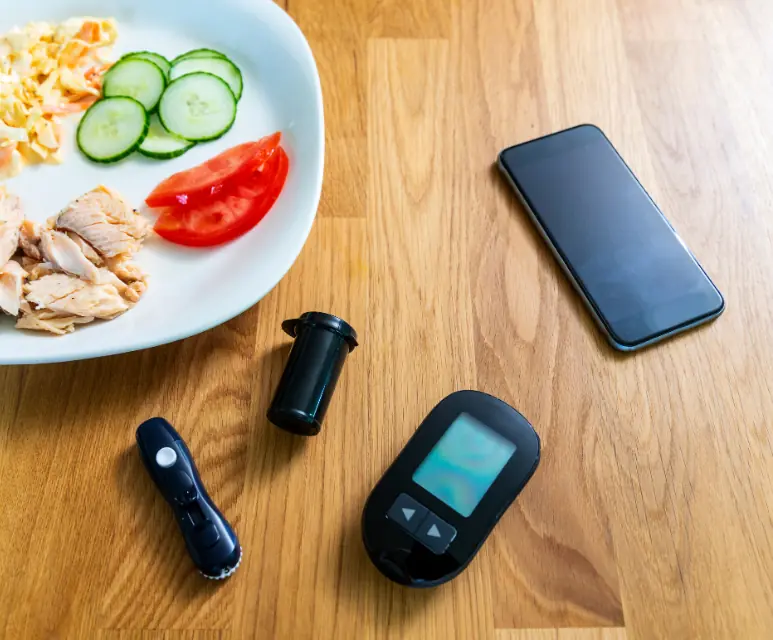Ozempic (semaglutide) is an injectable drug used to manage Type 2 diabetes. It’s effective for regulating blood sugar levels, but it may lead to adverse reactions such as nausea, vomiting, and diarrhea.
However, there are strategies to reduce or prevent these negative effects. Steering clear of specific foods can decrease the likelihood of gastrointestinal discomfort and enhance your blood sugar management.
What is Ozempic
Ozempic functions as a GLP-1 (glucagon-like peptide-1) receptor agonist. It aids in increasing insulin release post-meal and inhibits the liver from producing excess sugar. Additionally, Ozempic slows down stomach emptying, which can help you feel fuller for longer and reduce your appetite.
These mechanisms contribute to improved blood sugar regulation and may also lead to weight loss and other side effects. While weight loss might not be an issue for some individuals, other side effects can be more concerning.
Nausea is the most frequently reported adverse effect of Ozempic, impacting up to 20% of its users. Vomiting, diarrhea, stomach pain, constipation, and bloating are experienced by 5% to 10% of users.
It’s noted that higher doses of Ozempic tend to be associated with an increased occurrence of these side effects.
What Foods Should Be Avoided When Using Ozempic?
It is generally advised to avoid certain meals that can negatively affect blood sugar levels when using Ozempic (semaglutide) or any other medication for treating diabetes.
Remember that everyone reacts differently to food, so it’s critical to develop a customized plan in collaboration with your physician or a qualified dietitian.
Generally speaking, the following foods should be limited or avoided:
1. High-Sugar and High-Carb Foods
Given that Ozempic is primarily used to manage diabetes, it’s crucial to avoid foods that can spike blood sugar levels. High-sugar and high-carb foods can counteract the medication’s blood sugar-lowering effects. Foods such as sugary snacks, desserts, sodas, white bread, pasta, and other refined grains should be consumed minimally or avoided. Instead, focus on low-glycemic index foods that have a slower impact on blood sugar, such as whole grains, legumes, and non-starchy vegetables.
2. Fatty Foods
While Ozempic does not specifically interact with fatty foods, consuming a diet high in unhealthy fats can contribute to cardiovascular disease, which people with diabetes are already at a higher risk for. Foods high in saturated and trans fats, such as fried foods, certain cuts of meat, butter, and processed snacks, should be limited. Opting for heart-healthy fats found in fish, avocados, nuts, and olive oil can support overall health and the management of diabetes.
3. Alcohol
Alcohol consumption should be approached with caution while taking Ozempic. Alcohol can cause blood sugar levels to fluctuate significantly, complicating the management of diabetes. Additionally, alcohol can increase the risk of hypoglycemia (low blood sugar), especially when consumed on an empty stomach or in large quantities. If you choose to drink, do so in moderation and be aware of your body’s responses.
4. Foods High in Sodium
People with diabetes are at an increased risk for high blood pressure, and consuming excessive amounts of sodium can exacerbate this risk. Processed and canned foods, along with restaurant meals, often contain high levels of sodium. Reading labels and choosing low-sodium options can help in managing blood pressure alongside diabetes.
5. Large Meals
Ozempic slows gastric emptying, which can make it harder for your body to digest large meals. This can lead to gastrointestinal discomfort, including nausea, vomiting, and indigestion. To minimize these side effects, it’s advisable to eat smaller, more frequent meals throughout the day. This approach can also help in managing blood sugar levels more effectively.
6. Artificial Sweeteners
While it might seem like a good idea to replace sugar with artificial sweeteners, some studies suggest that they can negatively affect gut health and potentially lead to glucose intolerance. The research is still evolving, but being cautious about consuming large amounts of artificial sweeteners is advisable until more definitive conclusions can be drawn.
What Foods are Advised with Ozempic?
Ozempic (semaglutide) is a medication commonly used to treat type 2 diabetes. It’s crucial to note that individual dietary recommendations may vary based on your specific health condition, lifestyle, and the guidance of your healthcare provider or a registered dietitian.|
In general, when taking Ozempic or managing diabetes, a balanced and healthy diet is essential. Here are some general dietary guidelines that may be advised:
- High-Fiber Foods: Include plenty of fruits, vegetables, and whole grains in your diet. These foods can help regulate blood sugar levels and provide essential nutrients.
- Lean Proteins: Choose lean protein sources such as poultry, fish, tofu, legumes, and low-fat dairy products. Protein can help stabilize blood sugar and promote a feeling of fullness.
- Healthy Fats: Opt for sources of healthy fats, such as avocados, nuts, seeds, and olive oil. Limit saturated and trans fats found in fried foods, processed snacks, and fatty cuts of meat.
- Limit Added Sugars: Minimize the intake of foods and beverages high in added sugars, as they can lead to spikes in blood sugar levels. Check food labels for hidden sugars.
- Portion Control: Pay attention to portion sizes to help manage calorie intake and maintain a healthy weight.
- Regular Meals: Aim for regular, balanced meals throughout the day to help stabilize blood sugar levels. Include snacks if needed, and try to avoid long periods without eating.
- Hydration: Drink plenty of water to stay hydrated. Limit sugary drinks and opt for water, herbal tea, or other low-calorie beverages.

Ozempic and Weight Loss
Ozempic is an FDA-approved injectable medicine for diabetes that frequently results in weight reduction as a side effect. This adverse effect is especially important for people with type 2 diabetes who want to get healthier overall. Ozempic improves blood sugar control by acting as a natural hormone substitute.
Its effects on weight loss could be due to decreased hunger and elevated sensations of fullness.
The combined benefits of blood sugar control and weight loss highlight Ozempic’s all-encompassing benefits for diabetics. When thinking about Ozempic as a treatment option, it’s important to talk with a healthcare provider about specific health goals and possible adverse effects.
Final Thought
Ozempic, an injectable prescription medication approved by the FDA for diabetes treatment, may induce side effects such as nausea, vomiting, diarrhea, and constipation. Certain foods have a higher likelihood of triggering these side effects and can also hinder Ozempic’s ability to regulate blood sugar and insulin release.
For individuals using Ozempic, it is advisable to restrict or steer clear of specific foods. Examples of foods to avoid encompass those that are greasy and high in fats, items with elevated sugar content, ultra-processed carbohydrates, and alcoholic beverages.
For your prescription needs, consider ordering Ozempic from 365 Script Care, our trusted pharmacy partner.





